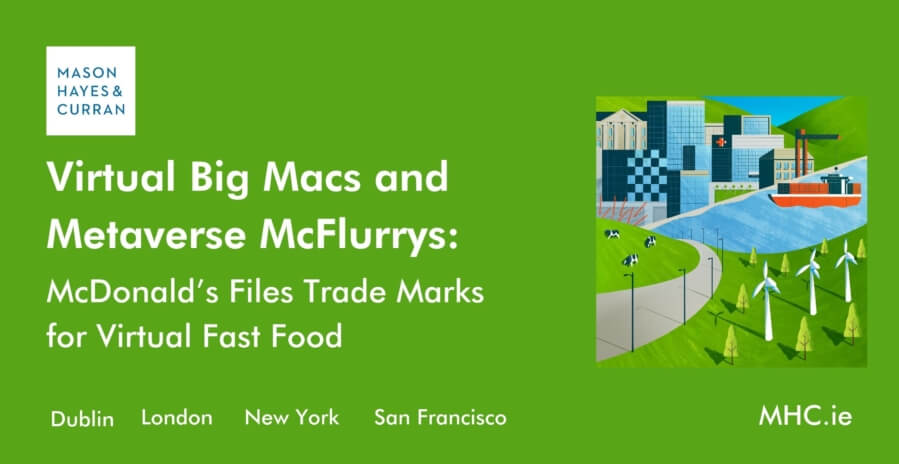
The world’s largest fast-food restaurant chain, McDonald’s, has recently filed 10 trade mark applications with the US Patent and Trade Mark Office (USPTO) and three trade mark applications with the European Union Intellectual Property Office (EUIPO) for the McDonald’s brand and McCafe trade marks which are seeking to protect “virtual food and beverage products.” These new trade mark registrations will protect the idea of a McDonald’s restaurant in the metaverse that can sell both virtual and real-world fast food in real-time. McDonald’s is just one of a number of high-profile companies in the food and beverage sector to recently take this step. Indeed, Panera Bread in the US recently filed a similar application, and the US retail giant Walmart has also stated its intention to do the same. It is now expected that many companies in the food and beverage space will file similar trade mark applications covering virtual goods and services over the course of the next 12 months.
The metaverse
The ‘metaverse’ is an online world in which users’ avatars meet, interact and explore a fast-growing network of virtual locations. This online world has recently generated significant investment from many other high-profile companies. For example, in February 2022, the US food company, Panera Bread filed a US trade mark application for the trade mark ‘Paneraverse’ and has since publicly stated its intention to build out virtual restaurants with home delivery features. In a similar manner to the recent McDonald’s applications, the Paneraverse mark seeks protection for non-fungible tokens (NFTs) to facilitate commercial transactions of virtual food and beverages, as well as computer programs to access such tokens in the metaverse, virtual entertainment services, and a virtual reward program.
Digital assets
Currently, the metaverse is mostly used for gaming and socialising. However, it is increasingly being used for work meetings also. ‘Land’ in the metaverse is a digital real estate asset that companies or individuals can buy, and then populate with games or other assets. The ‘plots’ are bought as NFTs, making them unique and exchangeable digital assets, the ownership of which is recorded on a blockchain. Many other high-profile companies such as Adidas, Crocs, Gucci and Gap have similarly expressed an interest in selling their goods in the metaverse. Nike has recently established a Metaverse Studio and has filed patent applications for its virtual assets. Facebook/Meta has equally launched its own metaverse world, Horizon Worlds, and Microsoft also has announced plans to launch a metaverse version of its Teams app.
Virtual protection
The new McDonald’s trade mark applications in the EU for the word mark McDonald’s, McCafe and its famous golden arches logo are seeking to protect “Virtual food and beverage products” and “Downloadable multimedia files containing artwork, text, audio and video files and non-fungible tokens” in Class 9. In addition, they also cover “online retail services featuring virtual goods” in Class 35 and “operating a virtual restaurant featuring actual and virtual goods, operating a virtual restaurant online featuring home delivery” in Class 43. The use of these marks will therefore involve the idea of a metaverse user walking into a McDonald’s restaurant, via an avatar and placing an order. A short while later and in addition to the virtual goods being delivered to the avatar, the real-life McDonald’s order is delivered to the user’s home. Aside from the virtual food and beverage products, the EU applications are also seeking to protect other brand offshoots including “Entertainment services namely, providing on-line actual and virtual concerts and other virtual events” in Class 41.
A new dawn or just a fad?
These new trade mark filings by McDonald’s represent a novel move from a trade mark perspective which others are expected to follow in the immediate term. However it is arguable that the filings are not entirely necessary. For example, the existing and extensive McDonald’s portfolio of trade marks would likely be robust enough to prevent any third party from opening a McDonald’s restaurant in the metaverse or copycatting the brand. That being said, the new filings will now ensure the protection is clear and that McDonald’s will have all the tools necessary to enforce their trade marks against potential infringers, including in the virtual world. The new filings are drafted sufficiently broadly so as to cover any virtual food and beverage products on any platform and not solely the metaverse. Given the increasing recent popularity and demand for innovative new technologies, from a brand protection perspective at least, these new filings represent a prudent enforcement strategy by McDonald’s. Whilst the US filings are expected to take approx. eight months to reach registration, the EU filings can be expected to proceed to registration within the next three to six months.
For more information, contact a member of our Intellectual Property team.
The content of this article is provided for information purposes only and does not constitute legal or other advice.
Share this:




